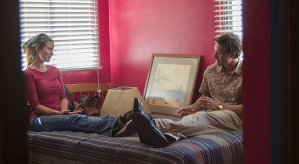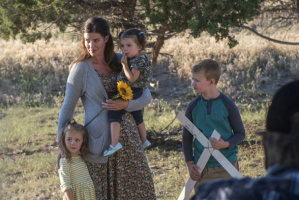
Mitch Davis staggered out of his BMW 633 CSi, bleary eyed and completely sapped of energy from a 24-hour shift at Disney studios in Burbank, California. During his 90-minute commute home to Glendora, he had only one thought in mind - to crumple into his heavenly bed and sink into a mindless state of sleep.
He pulled up to his modest California ranch-style home and commanded his lanky limbs to carry him to his bedroom. His three children - ranging in age from an infant to a 6-year-old - were running around in the living room, but in his zombie-like state, he didn't see them. With a heave he dropped his out-of-fuel body - dress-shirt and pants-in-all - into his bed, ready to soak in a few precious hours of sleep before heading back to the studio for another grueling day of going through stacks of poorly written screenplays. His fancy title as a creative executive at Disney was not that glamorous in reality.
Just as his heavy eyelids were sliding to a close, a voice interrupted, "This isn't working anymore. You, working at the studio, day and night."
It was Michelle, his wife of nine years and the mother of his three young children. They had been college sweethearts and she had given up everything to follow him to Los Angeles so he could attend the prestigious University of Southern California and get a job in Hollywood.
"What about our dreams?" Mitch replied in defense.
"My dream ... is a happy family ... and we're not doing so well," Michelle replied in a trembling voice, looking straight into her husband's eyes as if searching whether the Mitch she married was still in there somewhere.
She added, "I believe in you, but I don't believe in this version of you. I definitely don't believe in this version of us."
This tender confrontation between an exasperated wife and her workaholic, professional-ladder-climbing husband was one of the most poignant scenes in "The Stray" (October 6, 2017) - a film based on the true story of how a stray dog heals a broken family with an absentee dad.
I wasn't expecting to be this emotionally invested in the marriage of Mitch and Michelle, since "The Stray" movie poster and title all suggest that the emotional heavyweight in the film is the stray dog Pluto. But I was surprised at how Michelle's mix of firm love with an ounce of sass combined with Mitch's driven but off-kilter personalities made me care about them as persons and about the welfare of their marriage.
I imagine that many modern couples have had similar conversations about working too many hours, not spending enough time with the family, and having their work-life balance totally not be balanced. But what made this couple endearing and why viewers want to root for them is that Michelle was extremely patient with Mitch - continuously encouraging and giving him chances to change - yet by no means was she ever a doormat for Mitch to walk all over. She was firm and set him straight many a times, but always in a loving way. It made me wonder, what's so special about Mitch that Michelle would put up with this much? Was Mitch a different man before coming to Hollywood? How did they make the foundation of their marriage so strong that Mitch's cold attitude toward their young children didn't make Michelle pack up and leave?
It turns out those were the right questions to ask because the real-life Michelle Davis shared about their strong early foundation of marriage and family that wasn't depicted in the film. For four years before Mitch went to USC, he had worked at a job he "hated" as a bank computer system salesman to provide for the family. Mitch was a writer and creative by nature but he had suppressed his own desire to put the happiness and needs of his family before his own, Michelle explained. It was when Michelle saw how miserable Mitch was that she agreed to support his desire to get his Master's at USC and try to earn a living writing screenplays.
"I always knew at the core of Mitch, family was his number one priority," Michelle Davis told this reporter. "That everything he did was actually because he loved us and wanted to give us a good life, and on that journey, he got a little off course."
Mitch, it turns out, was not obsessed with climbing the promotional ladder for the sake of his ego, but he had an altruistic motive. It was understanding his deep motivation that helped Michelle endure the marriage for as long as she did.
While the movie never spent extensive time on their faith, it was interwoven in all their interactions and was understood to be the bedrock of the family and a force that kept them together. The children were shown throughout the film praying to God when they sensed danger and calling out to God when they had no one to turn to, but the film did not make the family's faith a direct focal point.
The Breadwinner Complex

Like so many well-meaning husbands and fathers out there, Mitch's love for his family was expressed through being a good breadwinner. The film depicts Mitch initially as a desensitized jerk but after understanding Mitch more, does a father sacrificing himself slaving at a movie studio for 24-hour shifts to pay the bills make him the bad guy? How many hard-working couples who put in long hours to provide for their families could relate?
"I'm almost 60 now so I can look back on this period in my life," Mitch Davis - who wrote, directed and produced "The Stray" based on his life - shared with this reporter, "one of the things that I think is just really ironic - just a fact of life - is it kind of hits you all at once when you get married and have kids. When you get married and start a family, you have the greatest financial stress, the greatest career stress, the greatest - often times - commuting stress. It all happens at once. It is so easy in those extremities to forget what matters most, forget why you're doing all that.
"Why was I doing all this? Well, because I love my wife and kids. I love my wife and my kids so much that we live a million miles from my office and I worked long hours so I would get promoted so I would make more money for my wife and kids. But then in the process, I began to lose my wife and kids."
Pluto the Wonderdog

It was in this confusing mess of a family - where the husband, wife and children only see each other in the wee hours of the morning and night, and the father wears a construction headphone at home to silence the kids so he can work more - that a mysterious stray dog Pluto comes in as a defender and friend to the neglected children. While Mitch rejects his defeated son's request to play baseball, Pluto is right next to 6-year-old Christian on the playground to chase away the school bullies, and there at the bus stop with a baseball in his mouth ready to play ball with the boy. With each simple gesture, Pluto is able to fill the void in the kids' lives and show Mitch in a non-judgmental way what his family really needs.
"My biggest fear while working in Hollywood was that I might succeed in gaining a voice only to forget what I wanted to say," said the real-life Mitch. "And that was the moment of truth in the bedroom when my wife and I had that big conversation, and when I was struck by lightening on the mountaintop (later in the movie).
"The last thing Hollywood or the world needs is one more person who sold their soul and has nothing to say. And so my big fear is that I might make all the compromises necessary to gain a bully pulpit but not have any message left in me nor inspiration left in me. That is why I am eternally grateful for my beautiful wife who is smart and strong, and for being struck by lightening, which was when I was reminded what is really important and was able to recalibrate and redirect my energies."






